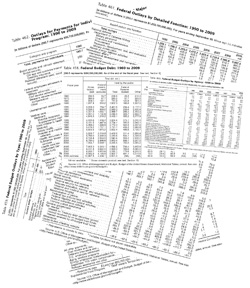Filed Under > Curriculum
Teaching Kids About the National Debt
Teachers College has received a three-year $2.45 million grant from the Peter G. Peterson Foundation to develop a comprehensive social studies and mathematics curriculum about the fiscal challenges that face the nation, which will be distributed free of charge to every high school in the country.
Teachers College has received a three-year $2.45 million grant from the Peter G. Peterson Foundation to develop a comprehensive social studies and mathematics curriculum about the fiscal challenges that face the nation, which will be distributed free of charge to every high school in the country.
Titled “Understanding Fiscal Responsibility: A Curriculum for Teaching About the Federal Budget, National Debt and Budget Deficit,” the non-partisan, inquiry-based curriculum will teach students the facts, significance and consequences for the United States and its citizens of public policies leading to persistent deficits and a growing national debt. The curriculum will be organized around several questions:
•What do we need to know and understand about the federal budget, national debt and budget deficit in order to make informed public policy choices that comport with our values and social goals?
•What are our national fiscal practices, policies and priorities?
•How should we address our nation’s enormous fiscal challenges today and in the future?
•What are the opportunity costs associated with not addressing the state of our nation’s budget, deficit, and debt?
With this year’s federal budget due to go before Congress in February, national attention will be focused on the state of the federal budget and the nation’s fiscal outlook. At the beginning of 2010, the federal government had borrowed nearly $8 trillion for the public, including a $1.42 trillion added in the last fiscal year. The total debt, including debt the government owes itself, exceeded $12 trillion.
“We are confronted with urgent financial challenges fueled by mounting deficits and debt which threaten the long-term health of our economy,” says Peter G. Peterson, Founder and Chairman of the Peter G. Peterson Foundation. Peterson is also co-founder of The Blackstone Group, Chairman Emeritus of the Council on Foreign Relations, and former U.S. Secretary of Commerce. “On the country’s current course, our children will not do as well as their parents’ generation. Education is a critical component in setting a different course, but at present there is no comprehensive high school curriculum on our nation’s fiscal challenges. We felt that Teachers College, with its demonstrated track record of creating innovative, multimedia curricula was the partner of choice for this important project.”
“Most young Americans do not have an adequate understanding of the ever-increasing national debt, budget deficit, or of the budget process itself,” says Anand R. Marri, Assistant Professor of Social Studies and Education at Teachers College, who will lead the project. “In light of recent research showing that children possess the ability to understand specific economics topics such as banking, possessions/ownership, prices/profits and savings by the time they reach the age of eight, we expect that adolescents with a more informed perspective about the national debt, federal budget, and budget deficit from our curriculum will be able to make more knowledgeable and responsible decisions about their own finances and demand better decisions from their elected leaders.”
A baseline study funded by the Peterson Foundation and conducted by Marri has found that current economics education about the federal budget and fiscal policy is virtually non-existent in U.S.
Led by Marri, an extensive ensemble of faculty and graduate students from Teachers College’s Social Studies and Mathematics programs will work on “Understanding Fiscal Responsibility.” The curriculum will be field-tested in a nationally representative sample of 25 schools in three cities (Austin , Pittsburgh , and New York City National Center
The curricula will incorporate books, primary sources, simulations, films such as “I.O.U.S.A” and other visual and digital media. It will be appropriate for students ranging from grade seven through college, and for teaching in five subject areas: Civics/Government, Economics , U.S.
Teachers College, through its Social Studies program, has created several award-winning multimedia curricula. In 2007, with funding from the Rockefeller Foundation, a team led by Margaret Crocco, the program’s coordinator, created “Teaching The Levees: A Curriculum for Democratic Dialogue and Civic Engagement,” which—keyed to the HBO documentary When the Levees Broke: A Requiem in Four Acts, directed by Spike Lee—explored civic issues raised by Hurricane Katrina and its aftermath. “Teaching The Levees” has been distributed free of charge to more than 30,000 schools and community organizations nationwide. Through that project, EdLab , a research and creative services unit within the College’s Gottesman Libraries, gained access to more than 50,000 educators. EdLab , which will produce and distribute copies of the “Understanding Fiscal Responsibility” curriculum and maintain a Web site for the project, will use that database to target secondary school social studies and math teachers, supervisors and administrators likely to be interested in the curriculum.
Materials for the project are being developed under the oversight of a national advisory board. The board’s membership, while not yet finalized, currently includes Robert A. Sunshine, Deputy Director of the Congressional Budget Office; Lloyd Bromberg, Director of School Programs at Federal Reserve Bank of New York; three leading economics educators (Henry M. Levin, Director of the National Center for the Study of Privatization in Education at Teachers College; Philip Van Fossen, Associate Director of the Purdue University Center for Economic Education; and Mark Schug, Director of the University of Wisconsin-Milwaukee Center for Economic Education); Joseph Peri, Acting President and Chief Executive Officer of The Council For Economic Education (CEE); David Anderson, Vice President of Working In Support of Education (w!se); and two award-winning secondary social studies and mathematics teachers (Susan D. Miller of NYC’s Eleanor Roosevelt High School and Rebecca Tatistcheff of the Bank Street College School for Children).
To learn more about the Peterson Foundation, visit www.pgpf.org.
Published Thursday, Feb. 4, 2010


